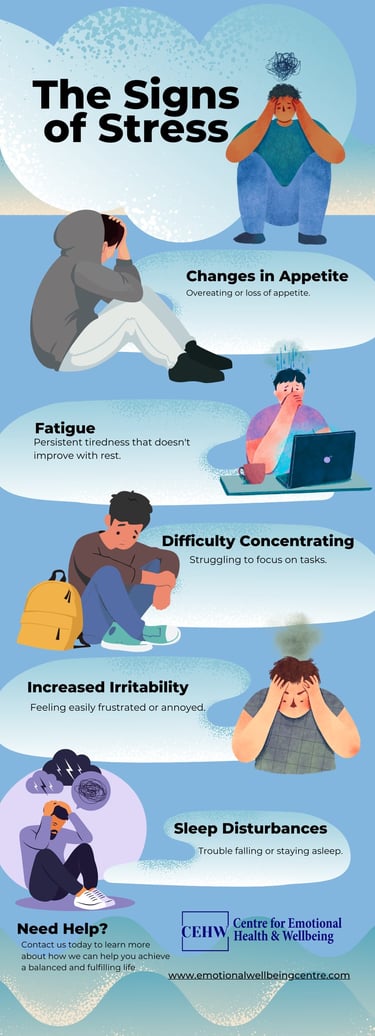Navigating Stress and Achieving Work-Life Balance
In this blog post, we explore the unique challenges that South Asian men in Brampton face when trying to balance demanding careers with personal and family responsibilities. We discuss the impact of cultural pressures on mental health and offer practical stress management techniques tailored to their needs. Featuring a real-life case study, this post highlights the importance of self-care, community support, and professional guidance in achieving a healthier work-life balance. Whether you're struggling with stress or looking to enhance your well-being, our expert insights provide actionable steps to help you lead a more balanced and fulfilling life.
9/1/20243 min read


In today's fast-paced world, professionals are often caught between the relentless pursuit of career success and the desire to maintain a fulfilling personal life. For South Asian men in Brampton, these challenges are further compounded by cultural pressures and societal expectations. At the Centre for Emotional Health and Wellbeing, we understand these unique challenges and offer tailored strategies to help manage stress and achieve a healthier work-life balance.
The Impact of Work-Life Imbalance on South Asian Men
South Asian men often face specific cultural pressures, such as the expectation to be the primary breadwinner and the importance of upholding family honour. These cultural norms, when combined with the demands of a modern career, can significantly contribute to stress and mental health challenges. Without proper
management, this stress can lead to burnout, decreased productivity, and strained personal
relationships.
Recognizing the Signs of Stress
Recognizing the early signs of stress is crucial to prevent it from spiralling out of control.
Common indicators include:
Increased Irritability: Feeling easily frustrated or annoyed.
Fatigue: Persistent tiredness that doesn't improve with rest.
Difficulty Concentrating: Struggling to focus on tasks.
Changes in Appetite: Overeating or loss of appetite.
Sleep Disturbances: Trouble falling or staying asleep.
If you're experiencing these symptoms, it may be time to reassess your work-life balance
and implement stress management strategies.
Effective Stress Management Techniques
Prioritize Self-Care
Cultural Considerations: Incorporate self-care practices that align with South Asian
cultural values, such as spending time with family, practicing mindfulness, or
engaging in traditional forms of exercise like yoga or meditation.Balance Work and Family: Set clear boundaries between work and personal life to
ensure quality time with loved ones.
Seek Support from Your Community
Connect with Others: Reach out to friends, family, or community members for
support and understanding. Sharing your experiences can help reduce feelings of
isolation.Join Support Groups: Consider joining support groups specifically for South Asian
men to connect with others facing similar challenges.
Practice Mindfulness and Meditation
Mindful Breathing: Incorporate deep breathing exercises into your daily routine to
reduce stress and improve focus.Meditation Techniques: Explore meditation practices that resonate with you, such
as guided or mindfulness meditation.
Time Management and Prioritization
Set Realistic Goals: Break down tasks into smaller, manageable steps and prioritize
them based on importance.Learn to Say No: Don’t hesitate to decline additional responsibilities if you're feeling
overwhelmed.
Seek Professional Support
Therapy and Counseling: A therapist can provide personalized guidance and support
in managing stress and achieving a healthier work-life balance.
Case Study: Ravi's Journey to Work-Life Balance
Ravi, a 35-year-old South Asian man living in Brampton, was struggling to balance his demanding career as a software engineer with his family responsibilities and personal well-being. The constant pressure to excel at work, coupled with cultural expectations to provide for his family, was taking a toll on his mental health.
Ravi felt overwhelmed, and irritable, and had difficulty concentrating. He was neglecting his hobbies, spending less time with his wife and children, and experiencing frequent headaches and sleep disturbances. He knew something needed to change but wasn't sure where to start.
Ravi decided to seek professional help and began therapy sessions. His therapist helped him identify the root causes of his stress, including unrealistic expectations, perfectionism, and difficulty setting boundaries. Together, they developed a personalized plan to manage his stress and improve his work-life balance.
Ravi started by implementing mindfulness techniques, such as meditation and deep breathing exercises. He also learned to prioritize his tasks and delegate responsibilities whenever possible. With his therapist's guidance, Ravi began setting aside time for himself, engaging in activities he enjoyed, and spending quality time with his family.
Over time, Ravi noticed a significant improvement in his stress levels and overall well-being. He felt more balanced, less overwhelmed, and more present in his relationships. He was able to maintain a healthy work-life balance while still achieving success in his career.
Ravi's story highlights the importance of seeking professional help and implementing effective stress management strategies. By addressing the underlying causes of stress and making conscious efforts to prioritize self-care and balance, individuals can improve their mental health and achieve a more fulfilling life.
In the end it is important to note that achieving work-life balance is essential for overall well-being. By implementing these strategies and seeking support, South Asian men in Brampton can manage stress more effectively and lead healthier, more fulfilling lives.
At the Centre for Emotional Health and Wellbeing, we are here to support you on your journey to better mental health. Experience the transformative power of therapy. Discover how our personalized approach can help you overcome stress and achieve your goals. Contact us today to learn more about how we can help you achieve a balanced and fulfilling life


Socials
Subscribe to our newsletter
Images obtained from www.freepik.com


